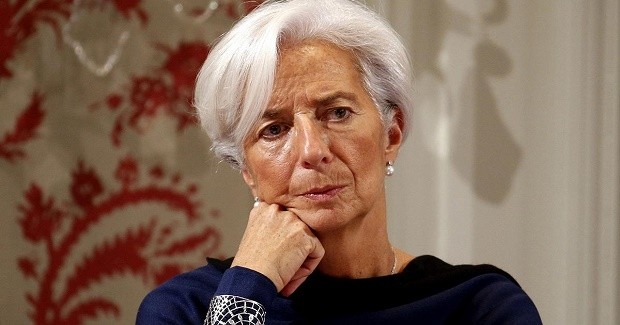 Christine Lagarde (Managing Director of the International Monetary Fund, IMF)[/caption]
Christine Lagarde (Managing Director of the International Monetary Fund, IMF)[/caption]
Economic analysts have faulted the Managing Director of the International Monetary Fund (IMF), Ms. Christine Lagarde, saying that the country’s debt to GDP ratio was in the balance, therefore, can raise funds from the bond market to finance development.
Lagarde had expressed concern over Nigeria’s debt profile, advising the Federal Government to be careful with its borrowing plans.
The IMF boss, who visited the country on a four-day working trip, warned the Federal government against taking foreign loans to run the economy, just as she told Nigerians not to expect an immediate improvement of the economy amid consistent fall in the price of crude oil at the international market.
Advertisement
However, the Chief Executive Officer of Financial Derivative Limited, Bismarck Rewane, while welcoming the IMF’s chief visit, said Nigeria’s to borrow more to bridge funding gap.
Rewane said: “Nigeria needs money at this time more than anybody else. The IMF may not likely put its money at this time, but the World Bank and African Development Bank surely will. We are going to tap the whole bond market and its quite clear that we would need N900 billion from the international market. So, we need the endorsements of Washington, Paris and London clubs.”
Also, a development economist, Odlim Enwegbara, described Lagarde’s advice as misleading, explaining that the country as at now, is creditworthy and can borrow as high as $270bn during the next four years without being debt trapped, stressing that the Debt Management Office (DMO) of Nigeria has been effective in the management of the country’s debt portfolio.
According to him, “this is however dependent on if our debt remains project-driven, particularly infrastructure-based loans that by reducing our current infrastructure deficit, reduce the present high cost of doing business and high interest rate causing high arbitrage.
Advertisement
“I was instead expecting her to insist on government justifying borrowing by borrowing purely for investment rather than for consumption.
“Ms Lagarde needed to have applauded the Buhari administration for its bold efforts to drastically increase investment in capital projects which he wouldn’t be able to do without having to borrow.
“Even though a lawyer and not an economist, her experience as someone who as a former French minister finance would have guided her advice in a way to agree that there’s no other way Nigeria should expect to solve huge infrastructure deficit head-on than to engage in massive borrowing, especially at a time when its main source of revenue, oil, is witnessing unprecedented plunge.
“Or isn’t it hypocritical of her to be advising us not to borrow given our debt-to-GDP ratio which at about 12 per cent is by far the lowest among our peers?” He queried.
The Federal Government on Thursday sold N136.24bn ($684.67m) in Treasury bills with maturities from three months to one year at its first auction of the year on Wednesday. The T-bills were at higher yields than previously, the Central Bank of Nigeria said.
Advertisement
On Wednesday, the Central Bank of Nigeria sold N55.4bn of three-month paper at four per cent, up from 3.62 per cent, at a sale on December 23.
It also sold N25bn of six-month debt at 6.99 per cent against 6.19 per cent, and N55.84bn of one-year paper at 8.05 per cent compared with 7.45 per cent.
Total demand stood at N311.5bn, compared with N226.97bn last time.
Nigeria issue treasury bills twice-monthly to fund the government budget deficit and manage liquidity in the banking system.
The Debt Management Office had in December last year stated that the country was in a strong standing to raise funds from the bond market to finance any deficit from the 2016 budget if it is so required.
The agency stressed that the Nigerian bond market had the capacity to bridge the funding gap in the budget.
The Director-General, DMO, Dr. Abraham Nwankwo, had said the slump in crude oil prices in the international market had made a deficit budget inevitable this year, adding that the DMO was prepared to borrow on behalf of the government to fund the deficit.
Advertisement
Nwankwo has dismissed the fear in certain quarters that the government might not be able to borrow from the bond market to finance any shortfall in the budget because of the recent delisting of Nigeria from the JPMorgan Bond Index. He added that the market was developed by domestic investors who were still around to invest in it.


